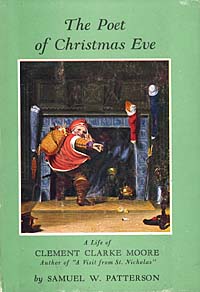 |
|
| The Livingston Family | Henry's Poetry |
| Montgomery's Expedition | Henry's Family |
| The Locust Grove Homestead | The Greater Livingston Family |
|
Robert Livingston, son of the Reverend John Livingston of Scotland, came to America in 1673, and later received a patent of 100,000 acres of land on the Hudson River. In 1694, thinking it necessary to go to England to advance his interest, he set sail for that country, if we may credit the family tradition. This voyage was disastrous. He was shipwrecked on the coast of Portugal and compelled to cross Spain and France overland. This accounts for the change in the coat of arms which was a ship in distress, in lieu of the original demi-savage, which is still borne by the family in Scotland. The motto was chanbged to "spero megliore," instead of "Si je puis," the motto of the Scottish branch.
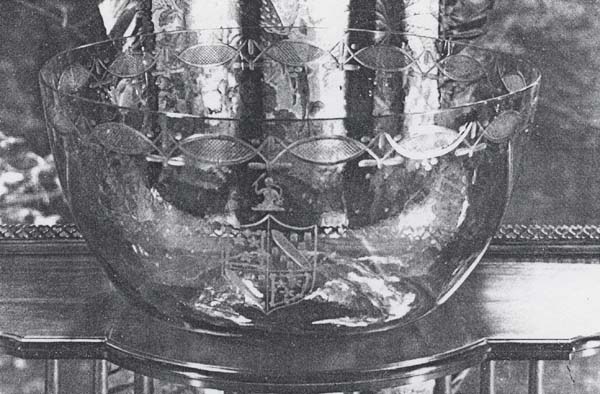 Robert Livingston had three sons: Philip, Robert and Gilbert. The latter's son Henry was a member of the Colonial Legislature and Clerk of Dutchess County. His son Henry, Major in the 3rd New York Continental Line, lived on the family estate "Locust Grove," situated on the old Post Road from New York to Albany, and died there in 1828. Later it was the home for many years of Professor Samuel Finley Breese Morse, inventor of the Telegraph and Atlantic Cable, whose wife was a great grandchild of the Major and inherited part of the property, with ourselves. The principal Manors of New York were Rensselaer, Livingston, Courtlandt, Philipsburg and Beekman: that of Livingston being the largest, though not the richest or most valuable. Several thousand acres were taken out for the Palatines in 1710, and called Germantown. Henry was twenty-seven years old when commissioned Major in the 3rd New York Continental Line under Colonel james Clinton, and his regiment ordered to join the Canada expedition under General Richard Montgomery, who had married his second cousin, Janet Livingston. He lived the life of a Country Squire and, unlike his kinsman of Clermont, was a staunch Whig (Federalist after the Revolution). [Except when George Clinton, a family connection, was running, then Henry supported Clinton's party.] His 5th great granduncle Alexander, 5th Lord of Livingston and Earl of Linlithgow, had the tutelage of Mary Queen of Scots during her youth, and accompanied her later to France. Mary was born at Linlithgow Castle, seat of Lord Livingston, Earl of Linlithgow, and was later a prisoner there by order of her cousin, Queen Elizabeth. She was also a prisoner at Bolton Priory for three days on her way to London, where she was beheaded by order of this cousin. Of all the Palaces so fairWhile in France, one of the four Marys who accompanied the Queen was Mary Livingston, and the following are the lines she made on her ladies in attendance: Mary Seaton, Mary Beaton | |||||||||||||||||||||||||||||
|
A soldier, poet, illustrator and musician, Henry, after serving his country with credit, settled down at his home "Locust Grove", Po'Keepsie on the Hudson to cultivate the arts of peace under his own "vine and fig tree," along these peaceful banks. Many sketches of his pen during travels at home and abroad show the features of life and thought at that time. When sailing up the Mohawk years before with Colonel Clinton, Benjamin North, Anthony Van Schaack and others, the lovely banks of this river seemed to him strangely suggestive of those meadow lands and lovely cliffs of his beloved Hudson. He speaks in his diary of arriving at Lake George, passing Saratoga, "a well settled lively place," and Fort Edward, where there were some clover meadows near the Fort. Crossing Lake George and passing by the ruins of Fort William Henry, where a few wretched hovels were formerly used as barracks, he crossed in a pettiauger, or perogue, with 22 men and got up to Ticonderoga Fortress. We arrived at General Montgomery's Camp, got our tents pitched and everything settled. All I heard of "WAR" was a few shells thrown in the evening: for every one we threw, our enemy returned us H---. General Montgomery remarked that "our troops" carry the spirit of freedom into the field and think for themselves.How alike in thought and deed to our brave boys in this recent WAR! October 18--I Received orders from the General to march with 100 men of our Regiment to Caghnawaga to protect that nation from any Insults Carleton might offer them, & there were now 2 expresses in Camp who said that a considerable number of Regulars & Canadians (5 or 600) were on their march to the Caghnawaga Castle-To support the troops I took with me, He gave me L160 in Half Joes. | |||||||||||||||||||||||||||||
|
The Homestead on the South Road was a simple two story, one of stone, with dormer windows and an old Dutch door divided in the center. Old residents of Poughkeepsie will doubtless remember the gable end facing the carriage drive which circled the fine lawn with its stately trees. Reminding one of the verses of "A Visit to Saint Nicholas," which has been attributed to the pen of Major Livingston, and a question of debate to this day. Fifty or more poems, many similar in their quaint swing and meter to that well-known poem of Childhood are to be found in the New York Historical Society. [If they were in the NYHS in 1921, they've been removed since then, as no originals or copies remain there. The original book of poems today belongs to the Thomas Collection.] The locust trees, whence the name of the place was derived, were in preference to all others as being the hardest and most durable of wood. The old King's Highway ran about 20 rods west of the old Post Road. The long, two-storied stone house, hardly to be dignified by the name of "Manor," stood away from the High Road and halfway from the river, showing an evident fondness of the original builder for fine lawn and trees rather than the water. The old Dutch door divided in the center and painted green like the blinds, always swung open when I, as a child, used to wander in and out of the deserted rooms (the house was then 160 years old). And mounting the creaking stairs, with imaginary gnomes and ghostly beings following me, I would sit by the big Dutch fire-place, which recalled the golden legends of the past to a Child's free imagination, and gaze with awe and wonder about me, for here my Great[-great] Grandfather's "Den" was located. Of yore he emerged from this Sanctum to read before the glowing fire the many lovely and quaint poems and rebuses his cultivated taste and leisure brought forth for the pleasure of his family. His taste for music, by preference the flute, the most fashionable in those days, being his chief delight, gave him occasion for writing out all he wanted, the scarcity of printed music being evident. These he fancifully embroidered round the edges with delicate etchings & quaint designs. (See New York Historical Society). [If the music book was in the possession of the NYHS in 1921, it today belongs to the Thomas Collection.]
| |||||||||||||||||||||||||||||
|
An acrostic written at "Locust Grove" on a favorite belle of Poughkeepsie, Miss Nancy Crooke, shows a quaint humor, and catching meter, similar to the same well-known poem. Nancy Crooke married Major Broome, and was the mother of Mrs. Judge Ruggles, Mrs. Judge Emmet, and Mrs. LeGrand Dodge of Poughkeepsie.
Note the similarity of
| |||||||||||||||||||||||||||||
|
The old, green latticed well in those days stood sentry to the flowing bowl and good cheer within. It is reminiscent of quite a thrilling incident. When a wee child, Catharine, the Major's daughter, broke loose from her nurse (who was doubtless flirting with the gardener, and oblivious to all else) and, climbing the well, disappeared over its side, the nurse only turning in time to see the child's heels vanishing below. In her terror, the nurse rushed to the child's rescue and, scrambling down the jagged stones of the well, succeeded in catching hold of the child, the water being fortunately low, and bringing up my future great grandmother in the old oaken bucket, none the worse for her dunking! When engaged to Arthur Breese of Utica, an old oak tree on the terrace was their trysting place, and to sail down from Albany in his sloop, anchor in the cove and walk up through the fields to the trysting tree of his heroine of the well, had a savor of romance about it quite refreshing in these more prosaic days. The following is a copy from the Poughkeepsie Journal of those days on her death, written by her father, Major Henry Livingston at Locust Grove. 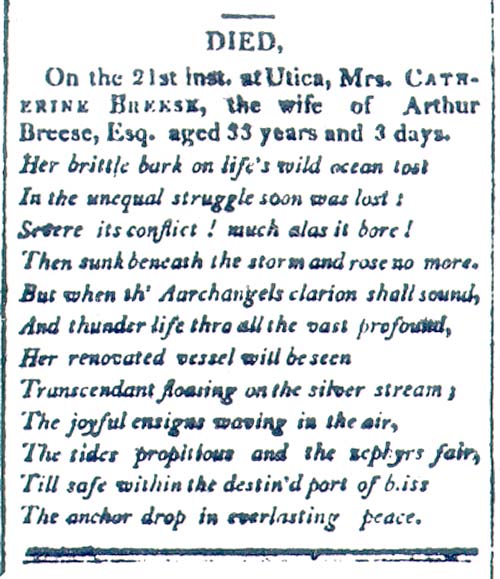 One of Catharine's six children, Catharine Breese, married 1st Lieutenant Samuel Griswold, USA, who at the age of twenty fought bravely in the war of 1812. 1st Lt. Griswold was taken hostage with two other officers by the British and detained in Quebec prison. His comrades, bent on escape, dug an underground passage and tried to persuade Griswold to join them. He refused, saying simply, "I am on parole." The other two were caught on emerging and put in closer confinement, while Lt. Griswold received every consideration from the British officers, meeting them at mess, and enjoying their companionship, until he was finally exchanged. The Major had two wives, equally lovely, Sarah Welles and Jane Patterson, quite a piquante little witch. Jane, not wanting to be restricted in the matter of dress and pretty things, came sailing downstairs one Sunday morning, shortly after her marriage, arrayed for church in a long scarlet cape, and dainty white satin hat with plumes. The Major, quite amazed by her gaudy attire, turned to her and said, "My dear, isn't your gown rather gay for church?" "Not at all," was her reply, "You always liked my gowns before we were married, why not now? I am going to wear just what I have on." Whereupon the dear man said not a word but, mounting the stairs, donned his military coat with brass buttons, three-cornered hat, and shoes with paste buckles and, without saying aught, gallantly led his bride to the coach, got in beside her, and told Joe, the colored coachman who sat grinning with glee at this amusing scene, to drive down the old Post Road to the Dutch Church in Poughkeepsie. Imagine the pair and the sensation they evidently caused!
| |||||||||||||||||||||||||||||
|
An amusing incident in the family is told to illustrate the popular wonder excited by the trial
triop of the first steam-boat "Clermont" up the Hudson. When Robert Fulton and Chancellor Livingston
succeeded in constructing the "Clermont," a test was made to Albany in September, 1807. The slaves
on the place viewed the snorting, buzzing monster with alarm, and ran shouting to their master,
"Massa Livingston, Massa Livingston, here cum a big saw-mill up de ribber." Three years after the close of the Revolution, at the age of twenty-one, Fulton went to London and became a pupil in painting of Benjamin West, as did S.F.B. Morse. In England, he met the Duke of Bridgewater, who had made the first important modern canal. The problem at once took hold of Fulton's broad mind and, like Morse in after years, he abandoned painting for mechanics. The ghost of Robert Fulton, like that of Montgomery, haunts the Manor and Lordship of Livingston at Clermont, for it was there he married Harriet Livingston, and enjoyed also the friendship and cooperation of the Chancellor, who made his lot easier than that of the ordinary inventor. And it was there, too, that he gave the finishing touches to the designs for the first steam-boat, which sank from the weight of its boilers. He exciteedly worked over it twenty-four hours without food, after which he was never well. At Trenton, cold fell upon his lungs, yet at Jersey City he stopped for three hours to look at his boats under repairs, and then rescued a friend from drowning who had fallen through the ice. Sick for some days, he again ventured to Jersey City in foul weather to see a steam frigate he was building, and that killed him. "He was buried in Trinity Church Yard 1815, and his name stands first on the ever-swelling roll of American Inventors," from Rambles in "Colonial By-Ways." Sacred also are the memories at Clermont of Janet Livingston, the Chancellor's sister, who gave her hand and heart to Richard Montgomery, the gallant Irishman who fell at Quebec at the early age of thirty-eight. Montgomery stood second only to Washington in the affection of the Revolutionary leaders. One's eyes fill with tears as one reads the story of Montgomery and his bride. He had been a Captain in the British Army and had met Janet while on his way to serve under Wolfe. When, a few years later, he returned to settle in America, he renewed his acquaintance, married her, and settled at Rhinebeck. Then the Revolution broke in upon his quiet and domestic happiness. He was one of the first Brigadier Generals created by Congress, which later detailed him as one of the leaders of the expedition against Quebec. He was reluctant to leave his home, but his heart was in the movement for Independence. "My honor is engaged," he told his wife, "And you shall never blush for your Montgomery." And so they parted, he to die at the gates of Quebec, she to survive in lonely widowhood for more than fifty years.
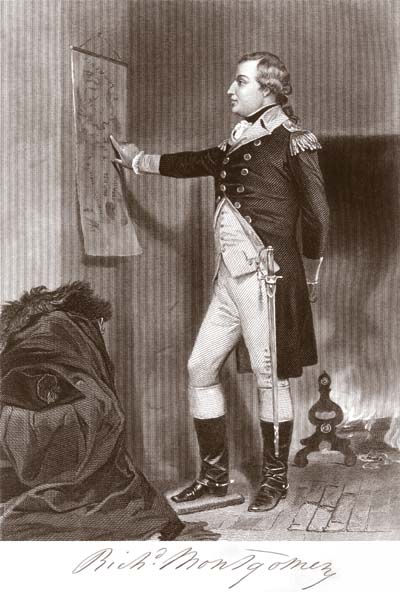
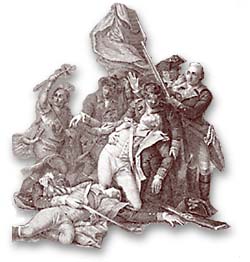
Montgomery was buried within the walls of Quebec with the Honors of War but, in 1818, his remains, at public request, were brought down the Hudson for burial in New York. word was sent the widow that the boat containing her husband's dust would pass her house at a certain time, so that she could be ready to look down from the portico and see what was forever beyond her reach. As at Clermont, Fulton perfected his invention of the steam-boat, so also was it at Locust Grove that Morse gave the finishing touches to his invention of the Atlantic Cable, and his ideas of carrying it out, to Cyrus W. Field, and pieces of the beautifully twisted, compact cable friends and relatives received as mementos.
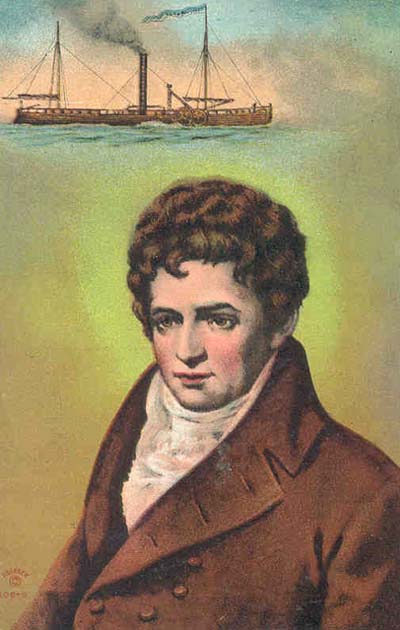
Often, as a wee child, I saw Mr. Field there as a guest for days at a time. Occasionally his two daughters would accompany him, and long after the cloth had been removed from the glossy mahogany, Mr. Field would bring out papers and pencil to take notes, and there the two men would sit, oblivious of time, intently pouring over this intricate and most interesting problem of laying the cable on the Ocean's bed to bring the world together. The younger man, Field, was being furnished with all the ideas and material for carrying it out so successfully, while the older one, Morse, the self-effacing grand originator, with white bear and gentle, luminous eyes, pointing the way - unmindful of glory or reaping a reward, only aglow with the thought of all the good that might accrue to humanity through its triumph. On this very ground cluster beautiful memories of noble, cultured souls: loyal patriots who melted their silver to provide money for the suffering solders of their friend, General Washington. The women of the family cutting up their rich gowns of English importation to make bandages, going about in homespun.
In the New York magazine are many sketches from the pen of Major Henry Livingston, with descriptions;
one of the old home of his cousin, Colonel Harry Alexander [originally his grandfather's, Henry Sr.],
which was shelled by the British as they came up the river, knowing them to be Whigs. The shell hole was
religiously preserved as a memento of those stormy times. Another sketch, quite unique and quaint,
was of West Point as it appeared at the end of the war, 1791. The plate says, "It stood most part of the war
the bulwark of the confederated states, and the terror of the British Arms. It mocked the will, as well as the force,
of its enemies."
A chain is seen on pontoons, reaching quite across the Hudson.
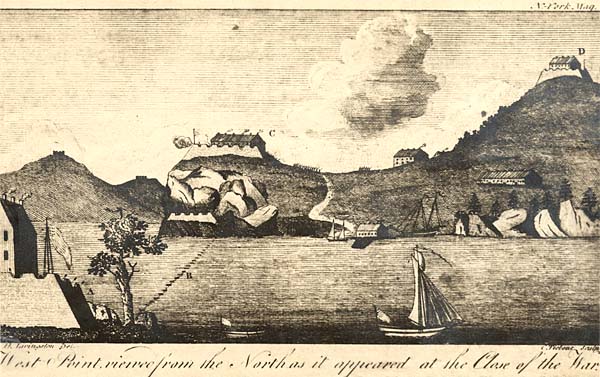
Fifty or more delicate poems, rhymes and quaint Rebuses, collected in the New York Historical Society,Note will give an idea of the originality of their author who, with leisure and cultivated tastes, filled his days with congenial pastimes that made for a happy and contented fireside. And these bits of fancy and homely incident were entirely for the delight and amusement of his beloved household, who gathered about him in the dear old home while, "The moon on the crest of the new fallen snow, gave a luster of midday to objects below." And out on the lawn, the imaginary reindeer glided swiftly along with tinkling bells, telling of the joyous coming of Santa Claus. While the children, with tremulous awe and delight, snugly tucked under bed clothes, waited breathlessly for the noiseless footsteps of that merry old Elf of mystery and cheer.
|

![]() Copyright © 2003, InterMedia Enterprises
Copyright © 2003, InterMedia Enterprises